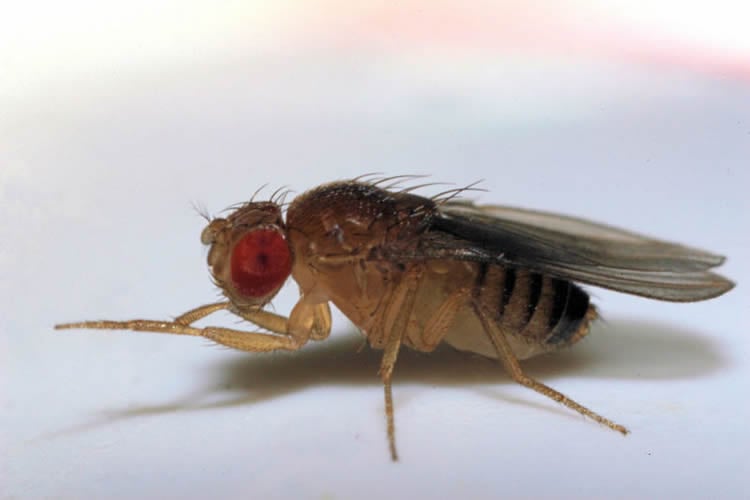Whether you’re a human, a mouse, or even a fruitfly, losing sleep is a bad thing, leading to physiological effects and behavioral changes. One example that has been studied for many years is a link between sleep loss and aggression. But it can be difficult to distinguish sleep loss effects from stress responses, especially in rodent or human models.
A team of researchers from the Perelman School of Medicine at the University of Pennsylvania used fruitflies to probe deeper into the cellular and molecular mechanisms that govern aggression and sleep. They found that sleep deprivation reduces aggression in fruitflies and affects their reproductive fitness. The team also identified a related molecular pathway that might govern recovery of normal aggressive behaviors. The work was published in eLife this week.
First author Matthew Kayser, MD, PhD, an assistant professor of Psychiatry, and the team focused on several chemicals that have been associated with aggression in fruitflies and other species. “There has been a lot of work on these monoamines, the same ones that are potentially involved in some aspects of mammalian aggression,” explained Kayser. “We asked what happens if we try to activate dopamine receptors or octopamine [the insect version of norepinephrine in mammals], a type of monoamine, after sleep loss in flies.”
After flies were given the chlordimeform (CDM), an octopamine agonist – a molecule that initiates a physiological response when binding to a cell-surface receptor — and the dopamine agonist L-DOPA and then sleep deprived, the researchers saw that CDM rescued aggressive behavior, but L-DOPA did not. “If you activate octopamine receptors, you rescue the fighting behavior,” said Kayser. “The other drug L-DOPA makes them really active, but they’re not fighting.” Neither drug affected fighting behaviors when flies were not sleep deprived.
Kayser notes that the relative simplicity of the fruitfly model compared to working with mammals is a more direct approach to studying the sleep-aggression link. “We first sleep deprived the flies and looked at their fighting behavior, and saw a huge, very clear effect on behavior,” he said. “Suddenly they go from fighting quite a bit to sharing resources and not fighting much.”
Kayser and his colleagues also studied the effects of reduced aggression on social behavior, specifically reproductive behavior and success. “We asked the simple question, does sleep deprivation affect sexual fitness?” The answer was yes: reduced aggressiveness of the sleep-deprived male flies clearly impaired their mating success when competing with non-sleepy males for females. Again, the molecule CDM rescued aggression and so also mating fitness in the sleep-deprived flies, while L-DOPA had no effect, reinforcing the link between aggression and octopamine signaling.
“Not to over-anthropomorphize, but I think this reinforces the notion that aggression is important for certain things, such as mating, not just a negative behavior,” noted Kayser. “In the fly, aggression can be important for carrying on a species’ genetic code, and if you do things that impede aggression, it can have negative effects.”

Next steps include figuring out the neurobiological mechanisms that control the sleep-aggression link. “Our work suggests that somehow downstream of the sleep neuron pathway, there’s a connection with aggression neurons, so we really want to understand what those are,” said Kayser. “We have reason to think they’re octopamine neurons, but we’d like to be able to identify exactly which neurons, and then how signals from the sleep centers are relayed to these aggression centers. The role of other monoamines, such as serotonin, remains to be explored as well.”
Much of the cellular and molecular mechanisms involved in behaviors such as sleep and aggression have been found to be highly conserved across species, raising the possibility of translating the present research to humans. “I definitely see the potential for translation here, although it may be in the distant future,” said senior author Amita Sehgal, PhD, a professor of Neuroscience and director of the Chronobiology Program. Sehgal is also a Howard Hughes Medical Institute (HHMI) investigator.
“That translation is always in the back of our minds,” added Kayser. “I have seen patients with dysregulation of aggressive behavior that’s not specific to any single disorder. If this type of work can someday open the door to a different way to effectively control, treat, or modulate aggression, that would be a pretty fantastic thing. Right now, from a pharmacological perspective, we don’t have a handle on more targeted interventions. I think that’s a real attraction to studying aggression in the fly – to work on the cellular and molecular controls to understand the basic biology of this pathway so we can leverage this knowledge into something that is eventually clinically relevant.”
Funding: The work was funded by the National Institutes of Health (K08 NS090461, T32 HL07713) and HHMI.
Source: Karen Kreeger – UPHS
Image Credit: The image is credited to Sanjay Acharya and is licensed CC BY-SA 3.0
Original Research: Full open access research for “Sleep deprivation suppresses aggression in Drosophila” by Matthew S Kayser, Benjamin Mainwaring, Zhifeng Yue, and Amita Sehgal in eLife. Published online July 28 2015 doi:10.7554/eLife.07643
Abstract
Sleep deprivation suppresses aggression in Drosophila
Sleep disturbances negatively impact numerous functions and have been linked to aggression and violence. However, a clear effect of sleep deprivation on aggressive behaviors remains unclear. We find that acute sleep deprivation profoundly suppresses aggressive behaviors in the fruit fly, while other social behaviors are unaffected. This suppression is recovered following post-deprivation sleep rebound, and occurs regardless of the approach to achieve sleep loss. Genetic and pharmacologic approaches suggest octopamine signaling transmits changes in aggression upon sleep deprivation, and reduced aggression places sleep-deprived flies at a competitive disadvantage for obtaining a reproductive partner. These findings demonstrate an interaction between two phylogenetically conserved behaviors, and suggest that previous sleep experiences strongly modulate aggression with consequences for reproductive fitness.
“Sleep deprivation suppresses aggression in Drosophila” by Matthew S Kayser, Benjamin Mainwaring, Zhifeng Yue, and Amita Sehgal in eLife. Published online July 28 2015 doi:10.7554/eLife.07643






